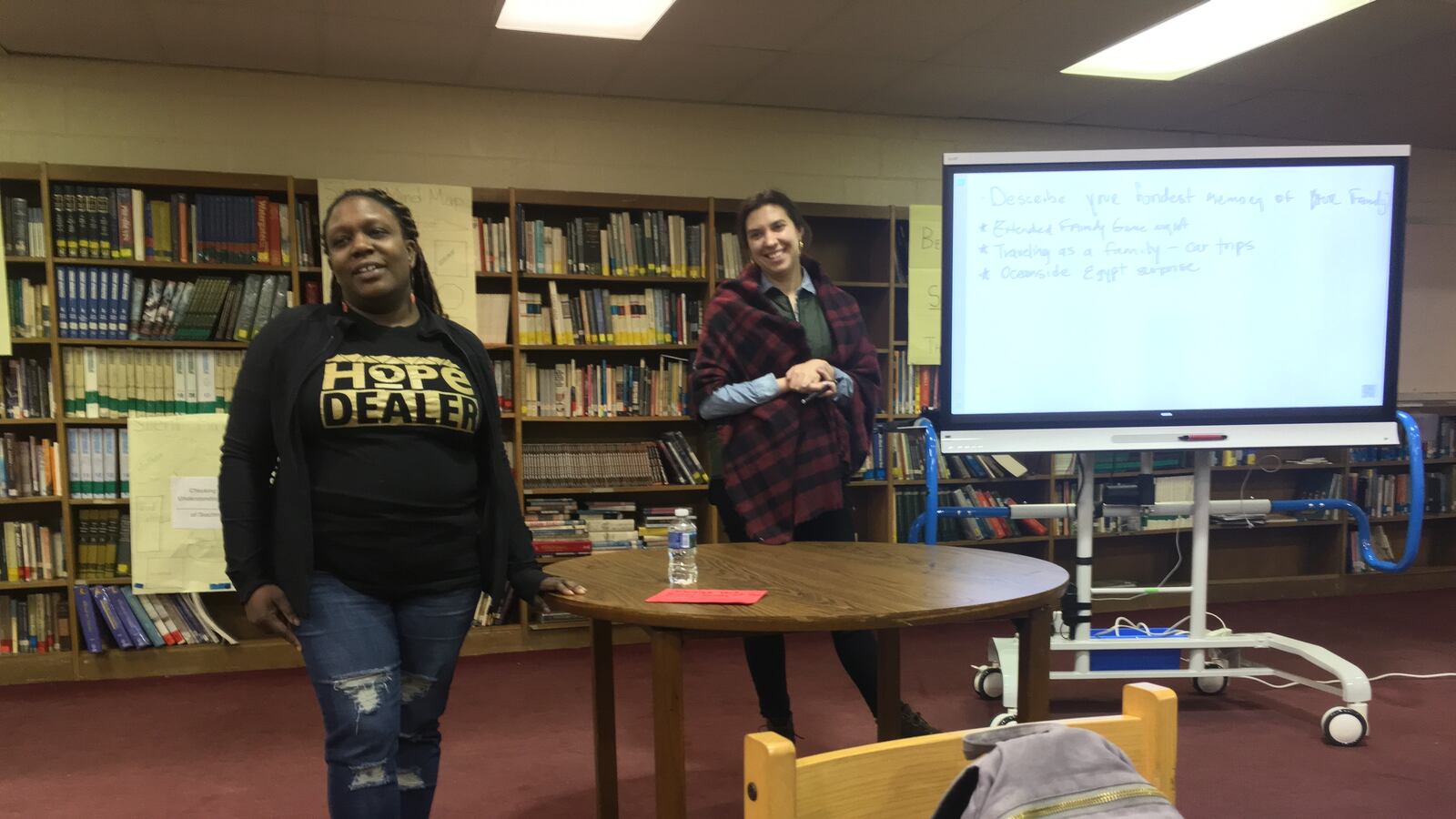This article was originally published in The Notebook. In August 2020, The Notebook became Chalkbeat Philadelphia.
Family was the emphasis when students and community members gathered at Martin Luther King High School as part of the Black Lives Matter Week of Action.
The Caucus of Working Educators organized last week’s event to promote racial justice and equality in education.
The event — "It Takes a Village: Black Families" — was “all about building a commitment to creating strong villages, strong families, strong communities,” said Kendra Brooks, a caucus member. “It’s all about reflecting on the past and thinking toward what’s next for the future.”
Brooks invited the racially diverse, intergenerational group of attendees to share their fondest family memories, the impact their families have had on them, and ways to improve their family relationships. Stories emerged about long road trips, family disputes, traditions, and communication.
The event reinforced several of the 13 guiding principles of Black Lives Matter that center on community and a strong bond through the generations.
The discussion “helped reveal a common thread that we often don’t see,” said Eric Marsh, a parent at Edward T. Steel Elementary: “We’re all part of the same family.”
Brooks encouraged people to look at the concept of family as a village, extending beyond relatives and into the surrounding community — friendships, schools, and so on. “These are the convos we’re missing,” she said. “Learning how to communicate with each other helps us sustain this village.”
Chanel Bourne, a senior at King High, said she went to listen. She said she grew up in a nuclear family and the event gave her a chance “to hear about different people’s lives.”
Similar discussions took place in school districts across the nation, including Seattle, Los Angeles, New York City, Boston, and Chicago.
In October 2016, teachers and administrators made headlines when they wore Black Lives Matter T-shirts to school in support of the movement. Three months later, the Caucus of Working Educators held its first Black Lives Matter Week of Action. In the summer of 2017, in Baltimore, the caucus explained its goals for Black Lives Matter Week of Action to a group of teachers from around the country, who decided to do similar work in their own districts.
From there, word of the event spread, and now cities across the United States are promoting racial justice in the classroom. More than 20 union groups, including the New Jersey Education Association, signed resolutions supporting the week.
The Philadelphia Federation of Teachers hasn’t issued a statement of support, but it has said that it is committed to issues that affect students of color.
The School District of Philadelphia “encourages teachers to responsibly engage students around important issues to develop critical thinking skills and a respect for the exchange of ideas,” said District spokesman Lee Whack.
Shira Cohen, a teacher at Feltonville School of Arts & Sciences and a lead organizer of Black Lives Matter Week, said that although it is exciting to see unions in other districts receive support, the work in Philadelphia can stand on its own with or without union support.
“This is an opportunity for all educators to do the good work to bring racial justice into our schools,” she said. “We want to be able to do this in our unions, and union members are doing it. Therefore it can be powerful. The work speaks for itself, and people are really excited about it.”
Black Lives Matter began as an online movement in response to the killing of unarmed black men by white police officers or armed white men claiming self-defense. Over time, the movement became a battle cry against all institutional forms of oppression, including racism, misogyny, homo/transphobia, and classism.
The movement has been at the forefront of police reform in the United States, mainly through organized protests. As a result, it has been mischaracterized as being anti-police, making it a target for conservative critics.
Last year, there was some pushback, but Cohen said that this year, that hasn’t been the case. She said, “People have had empowering experiences and are ready to deepen the work.”
Angela Crawford, an English teacher at Martin Luther King High, said she normally incorporates racial justice into her curriculum. For Black Lives Matter Week of Action, her students discussed and wrote about racial inequality in society. Most students chose education as their topic and discussed disparities in resources and experiences.
Crawford said she hopes those efforts help “students gain awareness that they have a voice. … Too many times, students aren’t given a voice.”
The second annual Black Lives Matter Week of Action wrapped up Saturday at Kensington Creative & Performing Arts High School with a closing panel discussion about the next steps to take.

